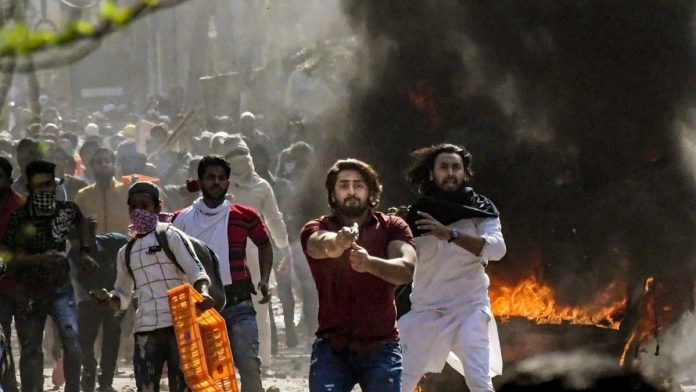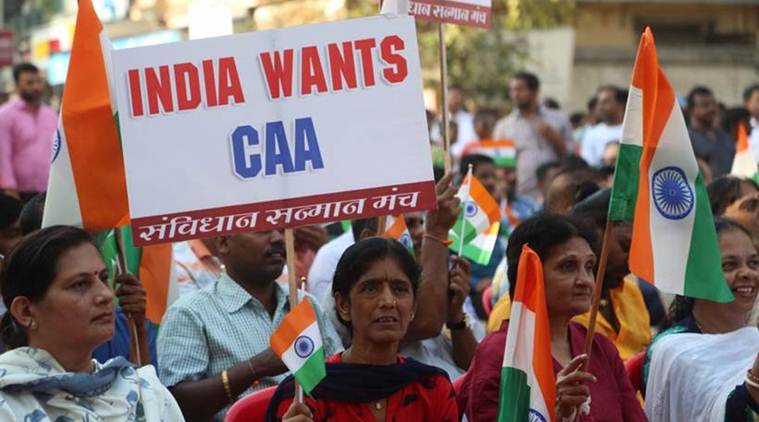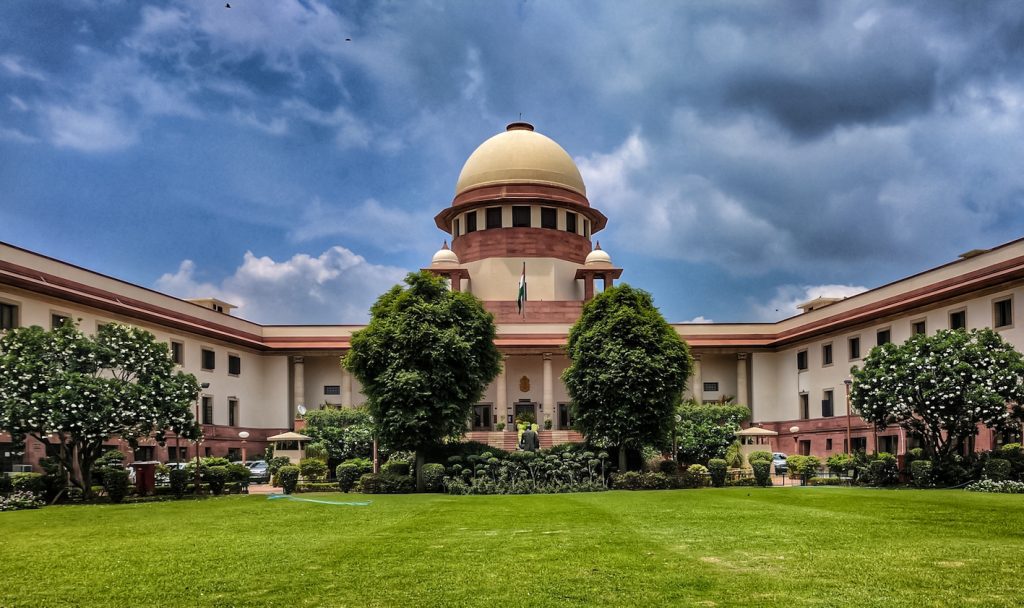
On the 11th of December 2019, the government led by the Bharatiya Janata Party (BJP) introduced the fifth amendment to the Citizenship Act. From the very get-go, this amendment has been in the eye of the storm. The Act has amended the Citizenship Act, 1955 to give eligibility for Indian citizenship to illegal migrants who are Hindus, Sikhs, Buddhists, Jains, Parsis and Christians from Afghanistan, Bangladesh and Pakistan, and who entered India on or before 31 December 2014.
People have come out on the roads in protest. Additionally, many humanitarians have highly criticised the said amendment as it is discriminatory in its nature. It is one of the few examples of religion being used as a prime factor to make law. This has led to multiple debates and furore across the country. While there are a group of people who see this amendment in a positive light, the amount of outrages taking place across the country indicates that there is a section of people within this nation who are furious at the government’s decision.

The protests have been the strongest in the North-Eastern states as the said amendment would make it easier for illegal migrants coming from Bangladesh to settle in these states. The people of the North-East have been facing a lot of problems with the illegal migrants and refugees setting their camp up in the states where the resources are already limited as compared to other parts of the country. With the introduction of the new amendment, refugees would become citizens of India and this would affect the political rights, culture and land rights of the people living in those states. Protests have been seen in other parts of the country too, from students to grown-ups, everyone has come out to raise their voice against this amendment. This is being perceived as discriminatory to Muslims, who follow Islam religion and demanded that Muslims be given equal rights.
Why did the amendment cause such an outrage?
The 2019 Amendment of the Citizenship Act has made it possible for refugees from Afghanistan, Pakistan and Bangladesh who are Hindu, Sikhs, Buddhists, Jains, Parsi and Christians to get Indian citizenship provided that they have entered India on or before 31st December 2014. One of the criteria for citizenship by naturalization is that the person must have stayed in India for 11 years which has been reduced to 5 years for the people belonging to these religions and sects. The amended Act excludes Muslims migrants, which is the main cause for the outrage across the nation.
People including students protested that the Muslims too be given the Indian Citizenship as one of the basic features of the country’s foundation which is secularism. The protest took a quick turn when police entered the Jamia Millia Islamia University, and detained the students for pelting stones and destroying public property in the name of protests against the said amendment. This incident led to more than a hundred students being injured. The said police actions were vehemently criticized, and this led to an escalation of the protests all over the country.
Amendment Provision
Section 2. In the Citizenship Act, 1955 (hereinafter referred to as the principal Act), in section 2, in sub-section (1), in clause (b), the following proviso shall be inserted, namely:— “Provided that any person belonging to Hindu, Sikh, Buddhist, Jain, Parsi or Christian community from Afghanistan, Bangladesh or Pakistan, who entered into India on or before the 31st day of December 2014 and who has been exempted by the Central Government by or under clause (c) of sub-section (2) of section 3 of the Passport (Entry into India) Act, 1920 or from the application of the provisions of the Foreigners Act, 1946 or any rule or order made thereunder, shall not be treated as an illegal migrant for the purposes of this Act;”.
Section 6. In the Third Schedule to the principal Act, in clause (d), the following proviso shall be inserted, namely:— ‘Provided that for the person belonging to Hindu, Sikh, Buddhist, Jain, Parsi or Christian community in Afghanistan, Bangladesh or Pakistan, the aggregate period of residence or service of Government in India as required under this clause shall be read as “not less than five years” in place of “not less than eleven years”.’.
What does the Government have to say in favour of this Amendment?
The Government has defended the Citizenship Amendment Act (CAA) by saying that the said Amendment has been brought about for the benefit of the people and has no intention of discriminating amongst people of different religions. According to the Intelligence Bureau report, about 31,313 people would be the immediate beneficiaries of this reform introduced. Further, it has also been stated that the present amendment does not really change the position of Indian Muslims to apply for Indian Citizenship. The reason that has been stated for this is how the countries mentioned in the amendment are Muslim majority countries. The threat of persecution is higher for people of other religions compared to that of Muslims. CAA deals with illegal migrants and has not affected the rights of legal migrants be that of any religion or nationality.

The Government has stated that the amendment is not introduced to discriminate against any community but to provide lawful refuge and protection to a migrant minority population, facing religious bias, in these Muslim dominated countries. They have also stated that the opposition parties have made use of this and gave rise to societal unrest. Mr. Dinesh Dhamija, member of the European Parliament stated that “The CAA offers a legal solution – one that currently does not exist – for future migrants coming from Pakistan and other countries.” He also pointed out the fact that CAA neither talks about forced expulsion of Muslim nor does it cancel any laws of naturalization. It simply makes the laws less stringent to protect religious minorities who face the threat of persecution in these countries.
Citizenship Amendment Act and Article 14
Article 14 is a fundamental right which has been given to every person in India. Needless to whether a person is a citizen of India or not their right to equal treatment is protected under A.14 of the Indian Constitution. A.14 reads, “The State shall not deny to any person equality before the law or the equal protection of the laws within the territory of India.”
This clearly shows that the rights of all the people within the territory of India are protected under this article. According to the existing laws, illegal migrants cannot apply for citizenship through registration or naturalization. The Passport Act and the Foreigners’ Act makes it possible for the government to put such illegal migrants in jail or deport them. However, with the introduction of the 2019 amendment, the government has made it possible for illegal migrants of religious minorities to get Indian citizenship. Can this be called a law discriminating on the basis of religion?

The answer to this question is yet unclear and shall remain so until the Supreme Court decides on the matter. The other issue we can identify is, though illegal migrants are people within the territory of India, would they too be protected under A.14? Having entered the country illegally, the Passport and Foreigner’s Act makes it completely legal for such people to be jailed or deported. However, if the government relaxes the laws for some religious minorities it can very well be said that a reasonable classification has not been made. Instead of arguing about illegal migrants being protected under A.14 the question that should be asked is whether a law in India can be based on religious discrimination?
When looked at in this light, A.14 provides a perfectly valid and simple answer, no. The test of reasonable classification under A.14 would clearly show that a law which discriminates on the basis of religion is not a legally valid piece of legislation. Senior Advocate Sanjay Hedge replying to the Union Home Minister’s comment on why A.14 isn’t violated stated that, “Reasonable classification has to do with the nexus of the classification. He (Shah) has only got one part of the phrase right. If the nexus of the classification are fleeing religious persecution, then all kinds of people can be fleeing religious persecution. It cannot mean that only people of certain faiths can be religiously persecuted and not others. An Ahmadiya or a Shia Muslim fleeing religious persecution from Pakistan or Afghanistan should be as entitled to ask for Indian citizenship as any Hindu, Buddhist, Sikh, Parsi or Christian.”
If the objective of the law is to protect people belonging to religious minorities against religious discrimination, it could be achieved without bringing in a law which violates the fundamental rights including human rights of the people.
Citizenship Amendment Act and the International Law
India is a party to both the International Covenant on Civil and Political Rights and the International Convention on the Elimination of all forms of Racial Discrimination. The right to equality before the law and the right to non-discrimination are rights protected under the above-mentioned treaties and are being violated by CAA. Though India is not a party to the Refugee Convention, it is still obligated to hold high the basic human rights of people in general, irrespective of their religion or country of origin.
The refugee situation is a major issue being faced by most South-Eastern Asian countries. It is imperative that a proper law is made which is in consonance with the principle of human rights and customary international law. It is crucial that India addresses its refugee problems, however, CAA may not be the most ideal way to go about it. ICJ on this matter delivered a statement saying that “India’s Citizenship (Amendment) Act, 2019 (CAA) arbitrarily excludes certain groups at risk of persecution, such as Muslims, from accessing an expedited path to citizenship, based on their religious affiliation. Our organizations urge the Indian government to amend the CAA to ensure that any path to citizenship provides for equal protection for persecuted persons, and does not discriminate on grounds such as religion or national origin…..”.
There is a growing need for well-defined refugee law in India, however, CAA may not be the law to address and protect the refugees, as it appears to violate the national law as also disregard the international treaties that India is a party to. Additionally, India has always shown its support for the principle of non-refoulment which in time has become customary international law. With the present amendment, questions arise as to what will happen to Muslim illegal migrants who are fleeing from religious persecution?
Conclusion
Our elected representatives continue citing the atrocities taking place against people of these religious minorities in countries like Bangladesh, Afghanistan and Pakistan. Often stating that India is the only country where such people can be offered protection as other neighbouring countries are all Muslim majority. Their reasoning to the amendment is simple, Muslims can seek protection from the Muslim majority countries. Who will protect the other religious minorities who are facing the threat of persecution?
The thought behind the amendment is honourable, however, the way of bringing about this change is what is causing unrest. Yes, there is a growing need to address the refugee issue in India. If India would have made a law to manage their refugee problems, they could have in the same process, helped, and protected the people of these religious minorities too. However, making a law which is discriminatory in nature and violates various international obligations may not be the most ideal way to go about it. India is known as the land of diverse religions and multiple cultures, wherein all are accepted and co-exists harmoniously. The 2019 amendment, on the contrary, has religion as a basis for classification and it can be potentially discriminatory against people of a specific religion.
The basic object of CAA is not wrong, minorities who are facing persecution must be protected. There is no denying the fact that we cannot accept any illegal immigrants in our country. They are not only a threat to our culture but our resources. However, can discrimination be done amongst these minorities to decide who should be protected and who should be not? We need to peacefully contemplate if this is the kind of practice we want to have in India, a country whose beauty is seen in its diversity?
It is time to introspect, delve, and constructively debate, whether refugee law is the need now or CAA is a move which was much needed, and we all need to accept it!